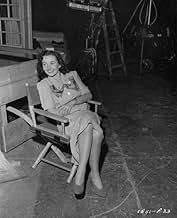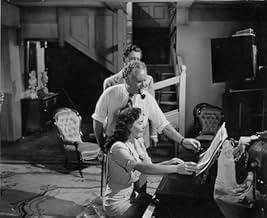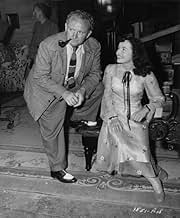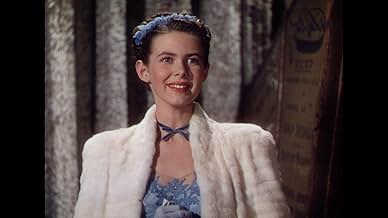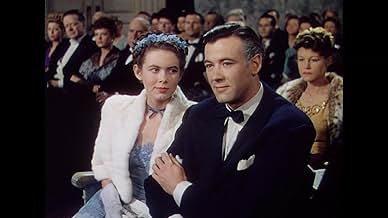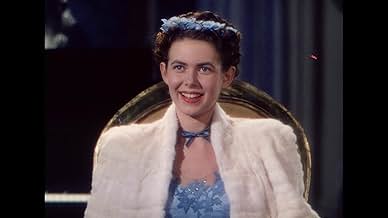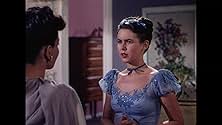VALUTAZIONE IMDb
6,4/10
398
LA TUA VALUTAZIONE
Aggiungi una trama nella tua linguaA beautiful young concert pianist is torn between her attraction to her arrogant but brilliant maestro and her love for a farm boy she left back home.A beautiful young concert pianist is torn between her attraction to her arrogant but brilliant maestro and her love for a farm boy she left back home.A beautiful young concert pianist is torn between her attraction to her arrogant but brilliant maestro and her love for a farm boy she left back home.
- Premi
- 2 vittorie totali
Bill Carter
- George Sampter
- (as William Carter)
Maria Ouspenskaya
- Madame Goronoff
- (as Mme. Maria Ouspenskaya)
Lillian Bronson
- Music Teacher
- (non citato nei titoli originali)
Edgar Caldwell
- Call Boy
- (non citato nei titoli originali)
Paulina Carter
- 12 Year Old Girl
- (non citato nei titoli originali)
Maurice Cass
- Music Teacher
- (non citato nei titoli originali)
Charles Coleman
- Butler
- (non citato nei titoli originali)
Recensioni in evidenza
The Dutch actor Philip Dorn plays a concert maestro, Leopold Goronoff, in this film. He's reputed to be one of the greatest pianists of his age....and he definitely has the ego for this...and then some! An old friend convinces Goronoff to take on a student and Myra (Catherine McLeod) is amazing. Eventually, she has her debut and Goronoff is angry because she is so good...perhaps better than him! What a putz! Despite this, Myra is in love with her mentor....and what chance does her childhood friend, George, have with her?
There are several problems with the film, though on balance the movie isn't bad. There are too many long and intense piano pieces and editing them down a bit or allowing for some lighter classical pieces would have helped the film. Additionally, Dorn's character is simply too awful to care about him and there is no reason for Myra to care about this jerk..none.. It's also very slow and the film doesn't seem to know when to end. On the plus side, McLeod is amazing on the piano, the Technicolor is amazingly good and the basic story is quite sound.
There are several problems with the film, though on balance the movie isn't bad. There are too many long and intense piano pieces and editing them down a bit or allowing for some lighter classical pieces would have helped the film. Additionally, Dorn's character is simply too awful to care about him and there is no reason for Myra to care about this jerk..none.. It's also very slow and the film doesn't seem to know when to end. On the plus side, McLeod is amazing on the piano, the Technicolor is amazingly good and the basic story is quite sound.
I love Frank Borzage's films (STREET ANGEL, 7TH HEAVEN, A FAREWELL TO ARMS, DESIRE, THREE COMRADES, THE MORTAL STORM being my favorites). Borzage was a director of immense talent and sensibility, a true master in every sense. I'VE ALWAYS LOVED YOU is his most lavishly produced film, in glorious Technicolor, and contains extremely beautiful sequences, but unfortunately falls short of being a great work. Borden Chase, the screenwriter, must be responsible for this, as he presents the character of the great Maestro Goronoff as not only arrogant, which could be easily understood, but also immature and frankly ridiculous in his womanizing, thus rendering him a type of buffoon most of the time. One can never understand the love that Myra Hassman feels for him, in spite of Catherine McLeod's fine performance. Thus, when the story reaches its first climax and Goronoff tries to steal the brilliance of his pupil first public concert (in Carnegie Hall, of all places) out of sheer jealousy, the impact of the scene is lessened. We never see the somber shades of his personality creeping in. The effect is incongruous. We cannot take this man seriously. Philip Dorn does not help, either. His acting is unnatural, a pure caricature that does not let a possible tragic dimension of his character shine through. Too bad. The ending is satisfying, at least, and we are left with the lovely image of Catherine McLeod in our memory. She was indeed a good actress and deserved to have had a more successful career.
Borzage's romantic melodrama follows a gifted young (female) pianist torn between her egomaniacal maestro and the absurdly good young farm boy she grew up with (played by a creepy, almost psychopathically serene Bill Carter). The music is really played by Arthur Rubinstein (who was given a huge paycheck for the time, especially considering the studio, Republic pictures, whose first color film this was) and features some great - if in the end excessive - pieces by Rachmoninoff and others. The characters are ultimately uninteresting and so sadly it hardly matters who ends up with whom, though everyone tries their best. It's all very nice though ultimately forgettable. The highpoint of this rather lavish production is the beautiful technicolor cinematography, which is quite nicely captured in the print restored by UCLA that is used on the laserdisc and VHS tape editions.
It's a very good story, like an interesting experiment in musical psychology, delving into and trying to reach the very essence and nature of the extreme sensitivity of the musical sense, but the acting is a bit stiff, and the story, although tremendously good and interesting, doesn't quite come alive. Catherine McLeod saves the picture, her acting is wholly satisfactory and convincing all the way, but the others are at times a bit too wooden. Philip Dorn is more abominable than not as the utterly rude and indecent conductor who thinks he can go at any length in insulting Catherine in the name of music, and no wonder she abandons music on conditions like that. There are many details in this artificial set-up that just don't work, they are neither credible nor natural, but there is nothing wrong with the idea. Although Frank Borzage made several films of music, and they are all good, it's over-evident that he was no musician himself.
On the whole, forget the flaws in the acting, the direction and the lack of musical realism but please follow and study the idea and the story, because the thoughts behind all this were humanly and psychologivally very interesting indeed.
On the whole, forget the flaws in the acting, the direction and the lack of musical realism but please follow and study the idea and the story, because the thoughts behind all this were humanly and psychologivally very interesting indeed.
This is director/producer Frank Borzage's most lavishly opulent sound film. It's a curio of a time long since past, when romanticism was celebrated and even the most wildly unrealistic moments seemed perfectly natural within their filmic contexts. Myra (the luminous and talented Catherine McLeod) is an aspiring concert pianist who comes to study under the imperious maestro Goronov (Philip Dorn), who was an admirer of her father (Felix Bressart) many years ago when the father was a professional pianist in Europe. But the father has since retired to rural America after meeting Myra's mother and forsaking his career for her 20 years earlier. (The mother has since died, and Myra's "maternal guidance" in the film is provided by the dimunitive powerhouse Maria Ouspenskaya, here playing Goronoff's mother and "the woman behind the great man.") As Myra is molded by Goronoff (who doesn't hold women in any high regard at all and goes through them like he would pairs of underwear, but who does respect talent) into a superior pianist, Myra falls in love with her Svengali. But Goronoff refuses to admit how much Myra has come to mean to him, and when her father dies, the grief-stricken Myra must choose between the man she has loved unrequitedly and a local farmer, George (Bill Carter) who has loved her all her life. Which one will she choose?
This is a classic woman's-film dilemma, and the characters in it are more mythical "types" than the flesh-and-blood, warts-and-all characters we would expect to see today. But that's not a problem for Borzage, whose intensly romantic, lushly envisioned films have always put love on the highest pedestal. What brings this film truly to life is the nuanced, deeply felt performances by all involved. Even the seemingly serene, uncomplicated George comes to life when declaring his hidden love for Myra. No matter how surreal the story may seem (especially if you're not used to seeing and enjoying classic cinema melodramas), the actors' and the director's commitment to it is absolute, giving the film an interior life and intensity that have made it a cult favorite and guilty pleasure, especially for Borzage fans. The classic Borzage theme: that metaphysical love can (and should) conquer all is ever present, as are the typical Borzagian dichotomies (e.g., between artist and simple country folk, passionate love and companionate love, men and women, and country versus city, etc.)
Borzage had just signed a multipicture deal with the fledgling Republic studios in 1945 when production began, and it's clear the studio spared no expense with their Academy-Award winning director. Lavishly photographed in Technicolor with colossal classical sets, exquisite costumes, and extensive piano doubling by Artur Rubinstein, I'VE ALWAYS LOVED YOU will definitely appeal to classical music lovers familiar with the backbiting world of professional music. All others need to watch not only with an open mind, but with an open heart.
Despite the somewhat contrived ending, I'VE ALWAYS LOVED YOU is worth seeing as one of Borzage's peniultimate films, and one he was able to make his most lushly romantic. To this day, few directors can boast such an incredible command of both the visual and emotional elements of almost every film (with the possible exception of Douglas Sirk). As Rainer Fassbinder once said of Douglas Sirk, you can tell from his films that he (Sirk) "really loves people, and doesn't depise them, as we do." The same could be said of Borzage--one of the cinema's first, last, and greatest romantics.
Kudos also go to the UCLA Archives for a superb Technicolor restoration. This VHS is definitely the version to watch. Beware of old black and white TV prints..
This is a classic woman's-film dilemma, and the characters in it are more mythical "types" than the flesh-and-blood, warts-and-all characters we would expect to see today. But that's not a problem for Borzage, whose intensly romantic, lushly envisioned films have always put love on the highest pedestal. What brings this film truly to life is the nuanced, deeply felt performances by all involved. Even the seemingly serene, uncomplicated George comes to life when declaring his hidden love for Myra. No matter how surreal the story may seem (especially if you're not used to seeing and enjoying classic cinema melodramas), the actors' and the director's commitment to it is absolute, giving the film an interior life and intensity that have made it a cult favorite and guilty pleasure, especially for Borzage fans. The classic Borzage theme: that metaphysical love can (and should) conquer all is ever present, as are the typical Borzagian dichotomies (e.g., between artist and simple country folk, passionate love and companionate love, men and women, and country versus city, etc.)
Borzage had just signed a multipicture deal with the fledgling Republic studios in 1945 when production began, and it's clear the studio spared no expense with their Academy-Award winning director. Lavishly photographed in Technicolor with colossal classical sets, exquisite costumes, and extensive piano doubling by Artur Rubinstein, I'VE ALWAYS LOVED YOU will definitely appeal to classical music lovers familiar with the backbiting world of professional music. All others need to watch not only with an open mind, but with an open heart.
Despite the somewhat contrived ending, I'VE ALWAYS LOVED YOU is worth seeing as one of Borzage's peniultimate films, and one he was able to make his most lushly romantic. To this day, few directors can boast such an incredible command of both the visual and emotional elements of almost every film (with the possible exception of Douglas Sirk). As Rainer Fassbinder once said of Douglas Sirk, you can tell from his films that he (Sirk) "really loves people, and doesn't depise them, as we do." The same could be said of Borzage--one of the cinema's first, last, and greatest romantics.
Kudos also go to the UCLA Archives for a superb Technicolor restoration. This VHS is definitely the version to watch. Beware of old black and white TV prints..
Lo sapevi?
- QuizThis was Republic's first feature in Technicolor.
- Curiosità sui creditiThe Republic Pictures logo does not appear on this film.
- ConnessioniSpoofed in It's a Grand Old Nag (1947)
I più visti
Accedi per valutare e creare un elenco di titoli salvati per ottenere consigli personalizzati
Dettagli
- Tempo di esecuzione
- 1h 57min(117 min)
- Colore
- Proporzioni
- 1.37 : 1
Contribuisci a questa pagina
Suggerisci una modifica o aggiungi i contenuti mancanti

